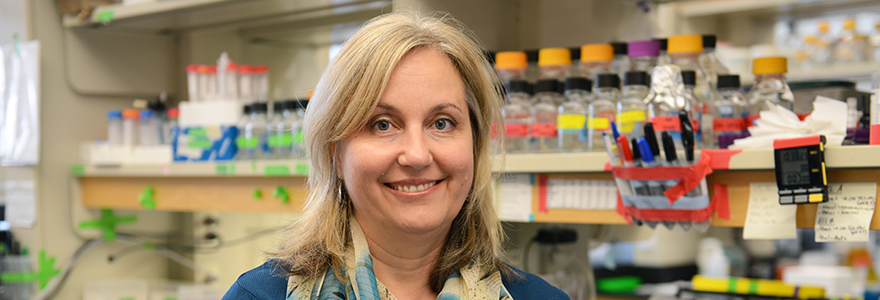Funding: CIHR announces Project Grant recipients
 By Communications
By Communications
Research to help improve memory in children with intellectual disability is one of several research projects at the Schulich School of Medicine & Dentistry that received more than $7.6 million in funding from the Canadian Institutes of Health Research (CIHR).Nathalie Bérubé’s project received $1,028,926 in total funding over five years to examine the role of microglial ATRX in brain development and cognition and how the brain’s immune cells regulate learning and memory.
“Mutations in the ATRX gene cause intellectual disability in children, meaning that they have difficulties in learning and memorizing facts or events,” said Bérubé. “The ATRX protein that is produced from this gene works to organize and package genes in the nucleus of cells and can therefore have distinct functions in different cell types that reside in the brain to help us remember correctly.”
The project team will study the effects of “knocking out” this intellectual disability gene in microglia in developing and adult male and female mice. Work will also focus on understanding the implications for therapies to help improve memory.
It’s just one of the many important research projects underway at the School, said David Litchfield, PhD, and outgoing Vice Dean of Research and Innovation.
“Funding will enable research and training opportunities in areas related to children’s health, neurological function, heart disease as well as bacterial and viral infection that offer the promise of improvements in diagnosis and treatment,” said Litchfield. “Grants will also support critical research projects in the areas of ethical design of clinical trials and access to primary care with the potential to inform policy related to health equity and the delivery of care.”
Congratulations to the successful CIHR project recipients
Stefan Everling, Professor, Physiology and Pharmacology, and Scientist, Robarts Research Institute – Cracking the functions of layers in the primate frontoparietal saccade network.
Daniel Hardy, Associate Professor, Obstetrics & Gynaecology and Physiology & Pharmacology - The adverse impact of prenatal cannabinoid exposure on placental and postnatal cardiovascular function: can we intervene?
David Heinrichs, Professor, Microbiology & Immunology – Defining and characterizing key players at the host: pathogen interface in MRSA infection.
Marlys Koschinsky, Professor, Dept. of Physiology & Pharmacology, and Scientist, Robarts Research Institute, and Michael Boffa, Associate Professor, Biochemistry, and Scientist, Robarts Research Institute – Use of a novel transgenic mouse model to probe the molecular mechanisms of lipoprotein(a) pathogenicity in atherosclerosis.
Julio Martinez-Trujillo, Professor, Physiology and Pharmacology, and Scientist, Robarts Research Institute – Neural substrates of spatial navigation in the Hippocampus of the freely moving marmoset.
John McGuire, Associate Professor and Undergraduate Chair, Medical Biophysics – Vascular endothelium-specific PAR2: mechanisms and effects.
Arthur Poon, Associate Professor, Pathology and Laboratory Medicine – Adapting genetic clustering techniques to SARS-CoV-2.
Dr. Charles Weijer, Professor, Department of Medicine, Department of Epidemiology & Biostatistics, and Department of Philosophy, and Monica Taljaard – Ethical issues in cluster randomized trials: using stakeholder and patient engagement to generate guidance for the ethical design and conduct of trials evaluating clinical, health policy, health systems, and public interventions.
Congratulations to the CIHR Priority Announcement recipients
Carole Creuzenet, Associate Professor, Microbiology & Immunology – Novel anti-Helicobacter pylori agents from lactic acid bacteria.
Dr. Anthony Nichols, Professor, Otolaryngology - Head and Neck Surgery – Defining the tumour immune microenvironment underlying chemoradiation resistance inhuman papillomavirus related head and neck cancer.
Sisira Sarma, Associate Professor, Epidemiology and Biostatistics – Access to primary care, preventive, care, chronic disease management and patient outcomes in alternative primary care remuneration models.
A full list of Western University’s CIHR funding recipients can be found here.









